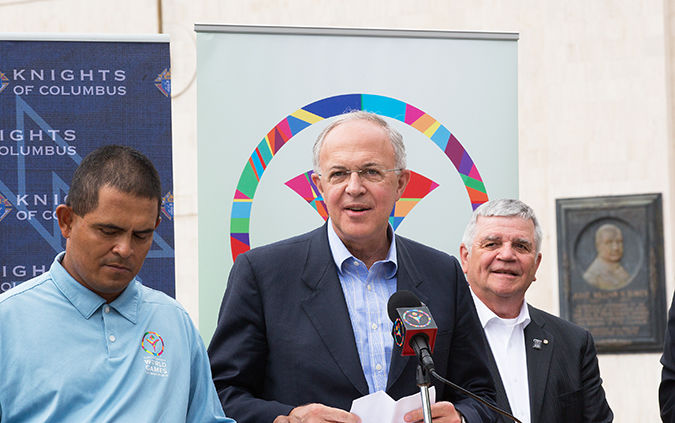Carl Anderson, Supreme Knight of the Knights of Columbus, took time to speak with The Tidings’ J.D. Long-García after a July 14 press conference at the Los Angeles Memorial Coliseum announcing the Knights’ $1.4 million gift to the Special Olympics World Games.
Why are the Knights of Columbus involved with the Special Olympics?
Well, we started this effort with the Special Olympics in 1968 when Eunice Kennedy Shriver and her husband, Sargent Shriver, began the first games in Chicago. Sargent Shriver was a proud member of the Knights of Columbus and we’re proud of Sarge and everything he did.
We’re very proud to be involved in Los Angeles. Since the Knights of Columbus are so active in Southern California, we thought the Knights had to be a big part of it.
The Knights of Columbus have a history built on immigrants and Los Angeles is a city of immigrants. This seems like a natural fit.
The Knights of Columbus grew out of the immigrant experience of Catholics in the 19th century through the Irish immigration. As the organization grew, the Italians, the Germans, the Poles — the Knights of Columbus reached out to all the immigrant communities. Today, we find so many more immigrants coming into the United States, and Los Angeles is really such a microcosm of that in so many ways. It’s the perfect match for the Knights of Columbus.
The Special Olympics, like the Knights of Columbus, are all around the world. That seems like a nice connection, too.
We’ve been expanding, and of course, we’re named after an explorer. So we need to move out of home base once in a while. With globalization, the work of the Church for charity is needed now more than ever. We’re more connected.
It’s possible now for a local community to help their neighbor next door. We’re helping AIDS patients in Africa. We’re helping typhoon victims in the Philippines. We’re helping children with disabilities in Mexico. We’re providing basic things, like wheelchairs, in Cuba. This is the world we’re living in now, and the Knights need to be a part of it.
When I was growing up, I always thought of the guys with the chapeaus and the swords. The service isn’t something people recognize all the time.
The Knights of Columbus, like the rest of society, evolves over time. That uniform, with the sword and the cape and the chapeau, is really a turn of the century admiral’s uniform. And so, those fourth degree Knights who want to participate in the honor guard, that’s their uniform.
But for hundreds of thousands of Knights who are very active in the Knights of Columbus, their work is more identified with charity and service. The fourth degree, the patriotic Knights, are also involved in works of charity. They’re just easier to see because they have uniforms. The other Knights, rolling up their sleeves and helping a neighbor, providing food in soup kitchens or all the acts charity that we do, we don’t have a uniform for that.
What role does prayer play in your life, given the responsibilities that you have?
Prayer has to reflect the most fundamental part of your life. So, if we think at the end of the day, everything is grace, everything that we have that is good is a gift from God. Prayer has to be a part of everything.
Catholics, we tend to be very formalized in many ways about our prayer. But if we look at prayer as an openness to God’s will in our life, asking him, especially when we don’t have answers, especially when it isn’t clear — you help me with this, you help me get through this, you show me the way — to me, that’s fundamental.
And of course, thanksgiving and praise and reflecting joy. But this idea that “I have trust in you” and therefore I want to be open to what your will is — if there’s success, it’s the success that you want. That’s what prayer fundamentally means to me.
Are there prayer disciplines that you find particularly rewarding or that you find yourself turning to more often?
Prayer in front of the Eucharist. Being in his presence, being open to what he will guide you to do. To me, that’s the most important part. And of course, the Holy Sacrifice of the Mass. At times it’s difficult. I’m not saying that it isn’t a struggle for me. But, more and more, entering into this mystery more deeply.
And I think also entering into the mystery of the Word of God that we find in Scripture. So many of the parables, so many of the statements, so many of the actions in Scripture, we’ve heard them for years. But to enter into more fully and more deeply and find its greater depth and meaning, and seeing the truth revealed, I think that too is a disciplined aspect of prayer.

